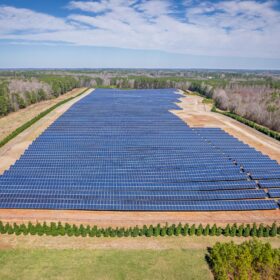The Senate narrowly passed Republicans’ budget bill in a vote 51-to-50, with most of the deep cuts to solar regulatory support left intact.
Over the weekend, the bill moved out of the Finance Committee’s updated draft in a vote of 51-to-49, sending it into heated debate on the Senate floor.
Votes of nay by three Republicans, Senators Susan Collins of Maine, Thom Tillis of North Carolina, and Rand Paul of Kentucky, brought the vote to a tie, with Vice President JD Vance casting the tie-breaker.
The bill has deep ramifications for the U.S. solar industry as well as the effort to onshore American manufacturing.
“This reconciliation bill proposal isn’t just misguided — it’s a direct attack on American energy, American workers, and American consumers. It guts the very industries that are lowering electricity bills, revitalizing U.S. manufacturing, and building more new power capacity than every other energy technology combined,” said Abigail Ross Hopper, president and CEO of the Solar Energy Industries Association (SEIA).
The one bit of good news is that the proposed “solar tax” was reportedly struck from the bill that passed. The Senate’s initial draft called for imposing a new 30% excise tax on solar projects if any of their manufactured components or intellectual property are determined to have originated from a foreign entity of concern (FEOC), even if the project never claimed a tax credit.
Last minute amendments aimed to somewhat lessen the blow of a rapid cut to tax credits. The Hickenlooper amendment (Amendment 2719) called to extend the 25D residential solar tax credit through the end of 2026, but this was rejected on a vote of 48 to 52. Another amendment appears to not have made it to the floor for a vote. Proposed by Senator Jodi Ernst (Iowa) and cosponsored by Republican Sens. Chuck Grassley (Iowa) and Lisa Murkowski (Alaska), this amendment sought to change language of tax credit phase out to “begins construction” instead of when production begins.
Solar proponents have expressed concern for how passage of this bill can affect the current trajectory of the solar industry.
“Despite limited improvements, this legislation undermines the very foundation of America’s manufacturing comeback and global energy leadership,” said Abigail Ross Hopper, president and CEO of SEIA. If this bill becomes law, families will face higher electric bills, factories will shut down, Americans will lose their jobs, and our electric grid will grow weaker.”
The bill now goes to the House for potential changes and vote before it goes to the President’s desk.
“Enacting this legislation would set back America’s global competitiveness, destabilize our energy future, and weaken the very industries that power our economy and strengthen our national security—while surrendering the 21st-century tech race to China,” Hopper said. “It will strip the ability of millions of American families to choose the energy savings, energy resilience, and energy freedom that solar and storage provide.”
“As the House reconsiders this legislation, every member should ask themselves what kind of future they’re voting for. Our communities, our businesses, and our futures are on the line,” Hopper concluded.
This content is protected by copyright and may not be reused. If you want to cooperate with us and would like to reuse some of our content, please contact: editors@pv-magazine.com.









By submitting this form you agree to pv magazine using your data for the purposes of publishing your comment.
Your personal data will only be disclosed or otherwise transmitted to third parties for the purposes of spam filtering or if this is necessary for technical maintenance of the website. Any other transfer to third parties will not take place unless this is justified on the basis of applicable data protection regulations or if pv magazine is legally obliged to do so.
You may revoke this consent at any time with effect for the future, in which case your personal data will be deleted immediately. Otherwise, your data will be deleted if pv magazine has processed your request or the purpose of data storage is fulfilled.
Further information on data privacy can be found in our Data Protection Policy.